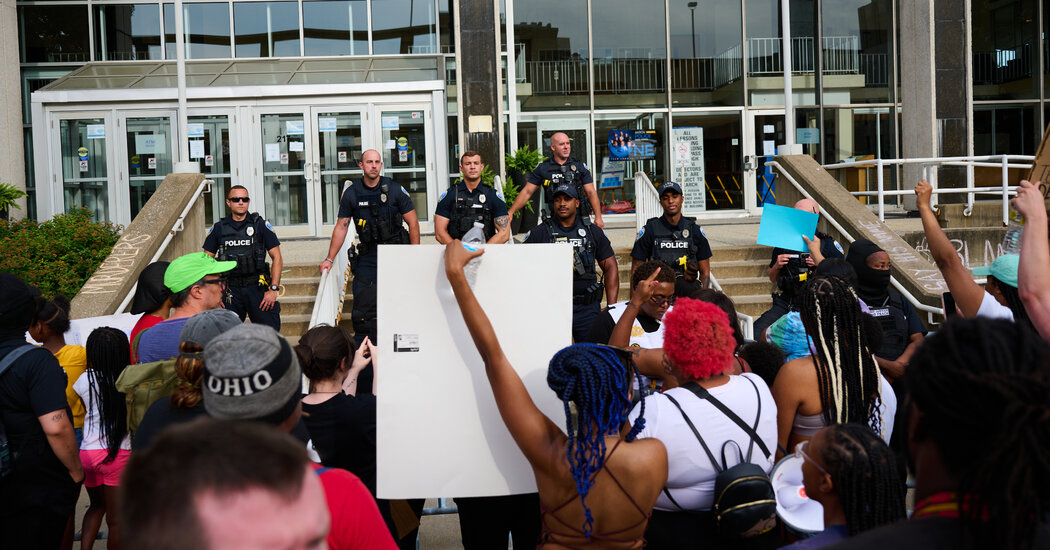
AKRON, Ohio — A 25-year-old Black man who was killed last week by police officers in Akron, Ohio, suffered more than 60 gunshot wounds but was unarmed at the time, the police chief said Sunday.
That detail was among the facts that began to emerge in the killing of the man, Jayland Walker, who died last Monday after fleeing the police during what was supposed to be a routine traffic stop. At a news conference on Sunday, the police released body camera videos of the pursuit and shooting that showed officers’ actions but deepened many questions around his death, which remains under investigation.
Mr. Walker had one traffic ticket and no criminal record. The police said they initially sought to pull him over for an equipment violation and a traffic violation.
Eight officers who were directly involved in the shooting have been placed on administrative leave according to department policy, the police said.
Following the release of the videos, hundreds of protesters marched in downtown Akron, demanding justice for Mr. Walker and decrying police violence, as Mr. Walker’s family urged the community to remain peaceful.
In one video, a popping sound can be heard at one point, and an officer reports gunfire coming from the door of Mr. Walker’s car. The shot itself is not visible from the footage, but during the news conference, footage from outside the car was shown that seemed to capture a muzzle flash coming from Mr. Walker’s driver’s side door.
The police said during the news conference that a handgun was later found in Mr. Walker’s car and that a bullet casing was found where they said he fired and that it was consistent with the weapon found in Mr. Walker’s vehicle. A still photo released by the police showed a handgun on the seat, along with a gold ring. Mr. Walker’s girlfriend died recently in a car accident.
Bobby DiCello, a lawyer for the Walker family, said Mr. Walker had only recently obtained the gun. “Jayland was not familiar with firearms, and we do not know if it accidentally fired,” he said. “But police did find no bullets in the handgun when they found it in the car after his death.”
In the news conference, the police did not address whether the handgun in the car was unloaded but said there was a loaded magazine on the seat.
As the chase continued — it lasted more than seven minutes — the footage shows an officer saying that Mr. Walker’s car is slowing down. (Mr. Walker’s car had reached speeds of more than 50 miles per hour at times going through residential neighborhoods.) Seconds later, Mr. Walker, wearing a ski mask, exits the vehicle and begins to flee on foot.
The chase was brief, and footage appears to show a number of officers pursuing Mr. Walker, weapons drawn, into a nearby parking lot while shouting at him. Police officers had initially deployed Tasers but were unsuccessful, the police said. A few seconds later, the officers open fire, and Mr. Walker drops to the ground.
Stephen L. Mylett, the Akron police chief, said he wasn’t sure how many total shots had been fired at Mr. Walker. He could not confirm the exact number of bullets that struck him (though he cited the wounds reported by the medical examiner), but he anticipated the number would be “very high.”
Chief Mylett said the officers contended that Mr. Walker had quickly turned toward officers and made a motion toward his “waist area.” The chief confirmed that Mr. Walker was unarmed after fleeing his car, however.
But Mr. DiCello said that in an earlier meeting that included the chief and the family, the chief said he had not seen evidence that suggested the officers’ lives were threatened.
The Ohio Bureau of Criminal Investigation is conducting an inquiry. After that is complete, the case will be turned over to the Ohio Attorney General’s Office for review.
The decision of whether to charge the officers involved with a crime will be determined by prosecutors, but charges have rarely been filed in similar cases of shootings involving the police. If a gun was fired during the chase, that fact could weigh heavily on the decision of whether to prosecute, and it could provide a measure of credibility to officers’ claims that they were in danger.
Mr. DiCello criticized how the police portrayed Mr. Walker in the news conference. “They want to turn him into a masked monster with a gun,” he said. The family’s lawyers also questioned the city’s release of only parts of the videos at the news conference and urged that it release all of the video.
The police said they planned to release all of the body camera footage captured by officers at the shooting. This, they said, would include footage from the eight officers involved directly in the shooting along with five others who were at the scene.
The release of the video on Sunday raised tensions that were already high in Akron because of the shooting. One day after more than 100 demonstrators gathered just outside downtown, chanting and holding signs, protests continued with hundreds participating in a march and rally at City Hall organized by the Akron N.A.A.C.P.
“It just keeps perpetuating, the same thing, over and over,” said Chris Mercury, 41, an African American barbershop owner in Akron. He added that people in the country would keep thinking that it was the person’s fault that this happened.
“And at the end of the day,” said his wife, Monique, a retail fashion store owner, “the threat to people who were in the same position of Walker, the danger is immediate no matter what they do.”
She added that “people from all races and backgrounds need to realize this is happening, and it just seems to be getting worse.”
The Walker family urged the city not to resort to violence.
“If you can do anything for the family, please give peace, give dignity and give justice a chance for Jayland,” Mr. DiCello said on Sunday. “My clients are private people. Jayland was a private kid. He wasn’t married. He wasn’t a criminal. He obviously was in pain. He didn’t deserve to die.”
Kim Barker and Steve Eder contributed reporting.




